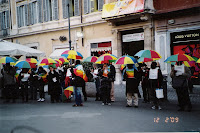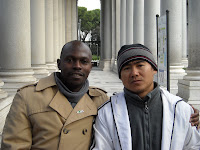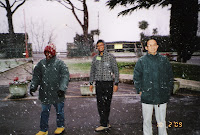Greetings from Rome. We just finished the Global Baptist Peace Conference early this afternoon. An image that captures one of the themes (not formally, but lived!) took place during a question and answer period following the plenary presentation of Gustavo Parajon. The Baptist pastor from Congo who is now pastoring an immigrant church in Milan got up to ask a question, but he began a long statement about the war in Congo. He was very well spoken, but clearly was not speaking directly to Gustavo's presentation. The moderator finally tried to cut him off and press for the question, even approaching for the microphone, but the Congolese pastor said, "Let me speak." He was proud, gentle yet insistent. He continued on determined to say what he wanted to say. Finally the moderator gave up and let him finished. Gustavo responded that one of the important things for people from small countries (perhaps small in terms of global power, not necessarily
geographic size) is the need to find a voice. This Congolese pastor raised his voice and was determined to have his say, and what he said was something we needed to hear as the war in Congo is the bloodiest since World War II yet gets very little attention.
Raising the voices from the margins was an important part of our experience. Sharon and I led a session that included teaching on Mainstream and Margin as well as the Bible study on Rizpah in 2 Samuel 21 in which she raised her voice through a nonviolent action from an incredibly marginalized position. We had stories from places like Morocco, Zimbabwe, Nagaland, Angola, and US prisons. We had sermons from a clergy couple from Cuba and a powerful sermon about violence against women.
 We had a demonstration in the piazza in front of the Baptist
We had a demonstration in the piazza in front of the Baptist  headquarters yesterday. We wore pinafores with signs about the various wars going on around the planet and the number killed in each conflict as well as quotes from people like Jesus, Gandhi and King. During the demonstration as people walked around our vigiling circle folks stood on the balcony outside the Baptist union office to read facts about the wars, then we had prayers from people from Uganda, Congo and other war torn lands.
headquarters yesterday. We wore pinafores with signs about the various wars going on around the planet and the number killed in each conflict as well as quotes from people like Jesus, Gandhi and King. During the demonstration as people walked around our vigiling circle folks stood on the balcony outside the Baptist union office to read facts about the wars, then we had prayers from people from Uganda, Congo and other war torn lands.But the importance of the voice being hear was experienced again in our worship service on Friday night which took place at the Waldensian Church downtown. After the demonstration we walked to the church for a 3-hour service with incredible music, a sermon from Ken Sehested and communion. But the telling moment came in the prayers of the people. They had organized a number of people from various countries to pray in their own languages followed by a sung response from the congregation. People from Zimbabwe, Cuba, Nepal, Italy, Congo and the US (my friend and neighbor Ken Flowers of the Greater New Mt. Moriah Baptist Church) were among those praying. It was time to end and the music leader started to move to the next song, but a man from Nigeria insisted on praying, and so he led in a prayer, then another from Uganda, then another. It was a beautiful moment of the Spirit moving the margins to speak, empowering the margins to take their holy place
before God's mercy seat and plead about the horrors and hopes of their countries. I was moved to tears at the power of having a voice for these dear friends.
There is so much to share. I encourage you to go to our website in a couple weeks to see some of the presentations, pictures and videos so you can share a bit in the conference: www.globalbaptistpeace.org.
Meanwhile, you can also pray for me. I'm coming down with a cold. I've been working like crazy on the conference logistics, finances and even some workshop leading. I haven't been getting much sleep. Then we spent a good part of Friday walking in Rome. Sharon and I shepherded friends from Liberia, Kenya, Bangladesh, Indonesia and the Philippines to give them an experience of a lifetime in Rome. Coming from those tropical countries, we have them our coats, stocking hats and gloves and wore lighter clothes ourselves. I'm not sure if that's what pushed me over the edge or following up our walking by standing in the cold for the vigil. But now I'm not feeling so well. Still it was worth it. The gathering was amazing, the connections, networking, plans made, encouragement and much that I'm sure will only be revealed in time. Thank you for your prayers, financial participation and solidarity.
Peace,
Dan






















